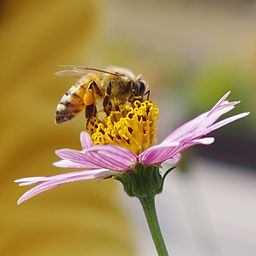Categories: "Animals"
Готовить/приготовить, часть вторая
The verb готовоить/приготовить means ‘to prepare’ in the sense of preparing food, in other words ‘to cook.’ It conjugates like this.
| to prepare | ||
| Imperfective | Perfective | |
| Infinitive | готовить | приготовить |
| Past |
готовил готовила готовило готовили |
приготовил приготовила приготовило приготовили |
| Present |
готовлю готовишь готовит готовим готовите готовят |
No such thing as perfective present in Russian. |
| Future |
буду готовить будешь готовить будет готовить будем готовить будете готовить будут готовить |
приготовлю приготовишь приготовит приготовим приготовите приготовят |
| Imperative | готовь(те) | приготовь(те) |
First off, it can be used in the sense of ‘to know to cook’ in general.
| — Твой папа готовит? — Нет, папа вообще не готовит. Всегда готовит мама или я. |
“Does your dad cook?” “No, dad doesn't cook at all. It's always either me or mom.” |
Of course, you can also use it with the verb уметь ‘to know how’ in the same meaning, but then you'll have to use an infinitive:
| — Твой папа умеет готовить? — Нет, папа вообще не готовит. Всегда готовит мама или я. |
“Does your dad know how to cook?” “No, dad doesn't cook at all. It's always either me or mom.” |
You can also use the verb if you want to specify a specific dish or cuisine.
| На ужин я приготовила бефстроганов. | For dinner I made Beef Stroganoff. |
| Мой брат всегда готовит итальянские блюда. | My brother always makes Italian food. |
| — Все говорят, что вы отличный повар. Из тех блюд, которые вы когда-либо готовили, какое самое интересное? — В пустыне Калахари я приготовил ужин из пятнадцатикилограммового дикобраза. Они намного вкуснее обыкновенных американских дикобразов. |
“Everyone says you are an amazing chef. What's the most interesting thing you have ever cooked?” “In the Kalahari desert I made dinner from a 30-pound porcupine. They are a lot tastier than ordinary American porcupines.” |

By Drew Avery (African crested Porcupine {Hystrix cristata}) [CC-BY-2.0 (http://creativecommons.org/licenses/by/2.0)], via Wikimedia Commons
Пчела
The Russian word пчела means 'bee'. It is end-stressed in the singular and root stressed in the plural. It declines like so:
| Sg | Pl | |
| Nom | пчела | пчёлы |
| Acc | пчелу | пчёл |
| Gen | пчелы | пчёл |
| Pre | пчеле | пчёлах |
| Dat | пчеле | пчёлам |
| Ins | пчелой | пчёлах |

Russia actually has an abundance of bees. Just a little while ago Russia sent some of their bees over to America to help revive the dwindling bee population. These Russian honeybees are really helping to boost bee populations around the world along with Italian honeybees.
Here are some example sentences:
| У меня пчела в волосах! | There's a bee in my hair! |
| Достань соты из улья, но осторожно, а то пчёлы ужалят. | Get the honeycomb out of the beehive, but be careful or the bees will sting you. |
| У меня аллергия на пчёл. | I'm allergic to bees. |
| Когда его ужалила пчела, он опух, как воздушный шар. | When the bee stung him, he swelled up like a balloon. |
Белка
The Russian word белка means ‘squirrel’. It declines like so:
| Sg | Pl | |
| Nom | белка | белки |
| Acc | белку | белок |
| Gen | белки | белок |
| Pre | белке | белках |
| Dat | белке | белкам |
| Ins | белкой | белками |
Here are some sample sentences.
| Белка грызет семечки. | Squirrel chews sunflower seeds. |
| Моя собака поймала белку. |
My dog caught a squirrel. |
| Его любимое животное - это белка. | His favorite animal is a squirrel. |
| Она часто говорит о белках. | She often talks about squirrels. |
| Когда он вышел во двор, он был окружен белками. | When he came out to the yard, he was surrounded by squirrels. |
There are quite a few species of squirrels that live in Russia. There is even the Siberian flying squirrel, which is the only species of flying squirrel found in Europe. Ironically, Белка was also the name of one of the dogs that were launched into space on board of Sputnik 5 on August 19th, 1960. They were the first dogs in space. After circling the Earth in a space craft, they safely made it back down as national cosmonaut heroes of the former USSR. This year, a new cartoon was released about the two dogs, originally called “Belka and Strelka: Moon Adventures”. However, since not too many people outside of Russia are familiar with who they are, the title was changed to “Space Dogs”.
Крыса
The Russian word крыса means 'rat,' as in the animal. It declines as such:
| Sg | Pl | |
| Nom | крыса | крысы |
| Acc | крысу | крыс |
| Gen | крысы | крыс |
| Pre | крысе | крысах |
| Dat | крысе | крысам |
| Ins | крысой | крысами |

Photo Credit: vadim.tk (Own work) [CC-BY-SA-3.0], via Wikimedia Commons
Here are a few sample sentences:
| Крыса грызла туфли. | The rat gnawed the shoes. |
| В доме есть крысы! | There are rats in the house! |
| Я был вчера на мусорной свалке и увидел много больших крыс! | I was at the dump yesterday, and I saw a lot of big rats! |
| Меня укусила крыса, пришлось сделать укол от бешенства. | A rat bit me, and I had to get a rabies shot. |
| Мой лучший друг — телепатическая крыса, которая защищает меня от забияк. | My best friend is a telepathic rat who protects me from bullies. |
That last sentence is the plot to the movie Ben. The movie had a famous theme song which was sung by Michael Jackson... Michael himself had a very odd life with friends few and far between, more comfortable with animals than people. Somehow his singing this song seems oddly fitting.
Кот
Russian has a word кот which means a male cat, in other words what we in English would call a tomcat. It's an end-stressed word, which means it always has the stress on the first syllable of the grammatical ending, if there is one, and on the last syllable of the word if there is not a grammatical ending:
| Sg | Pl | |
| Nom | кот | коты |
| Acc | кота | котов |
| Gen | ||
| Pre | коте | котах |
| Dat | коту | котам |
| Ins | котом | котами |
Here are a few sample sentences:
| Под окном дрались два кота. | Two tomcats were fighting under the window. |
| Ты видишь того кота? Я вчера видел, как он прогнал двух немецких овчарок. | Do you see that tomcat? Yesterday I saw him chase off two German Shepherds. |
| Господи, наш кот опять нассал на кухне. Надо его кастрировать.* | Good Lord, our cat has pissed in the kitchen again. We should neuter him. |
| Кот подкрался к мыши и прыгнул на неё. | The cat snuck up on the mouse and pounced on him. |
The Russians have a phrase that means “very little” which is related to cats, and that is «кот наплакал», literally “the tomcat cried.” For instance,
| — Сколько у тебя денег? — Кот наплакал. |
“How much money do you have left?” “Next to none.” |
| — Сколько осталось водки? — Кот наплакал. |
“How much vodka is left?” “Scarcely a drop.” |
* Warning: don't use the word нассать in polite company. It's pretty crude.
